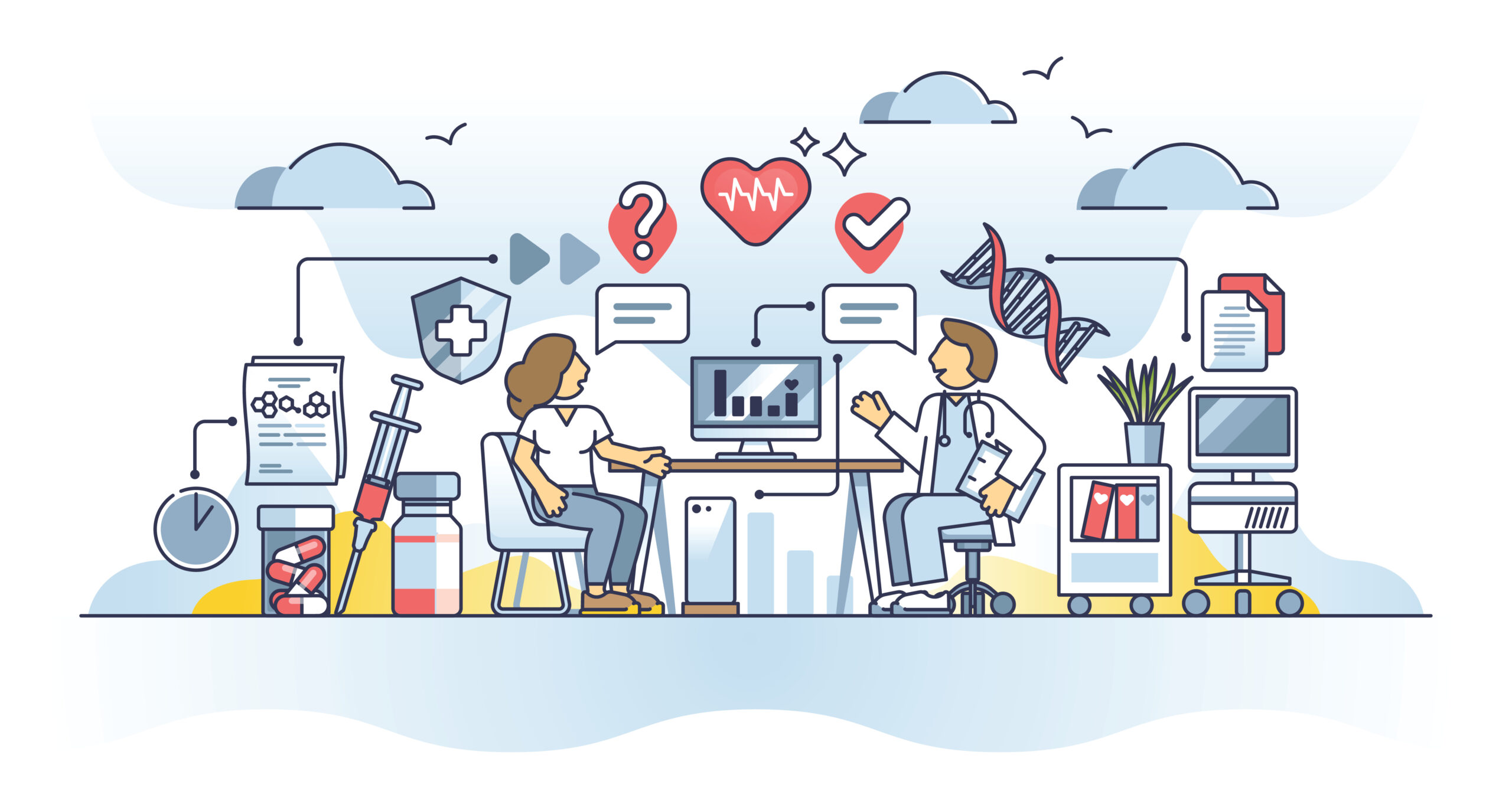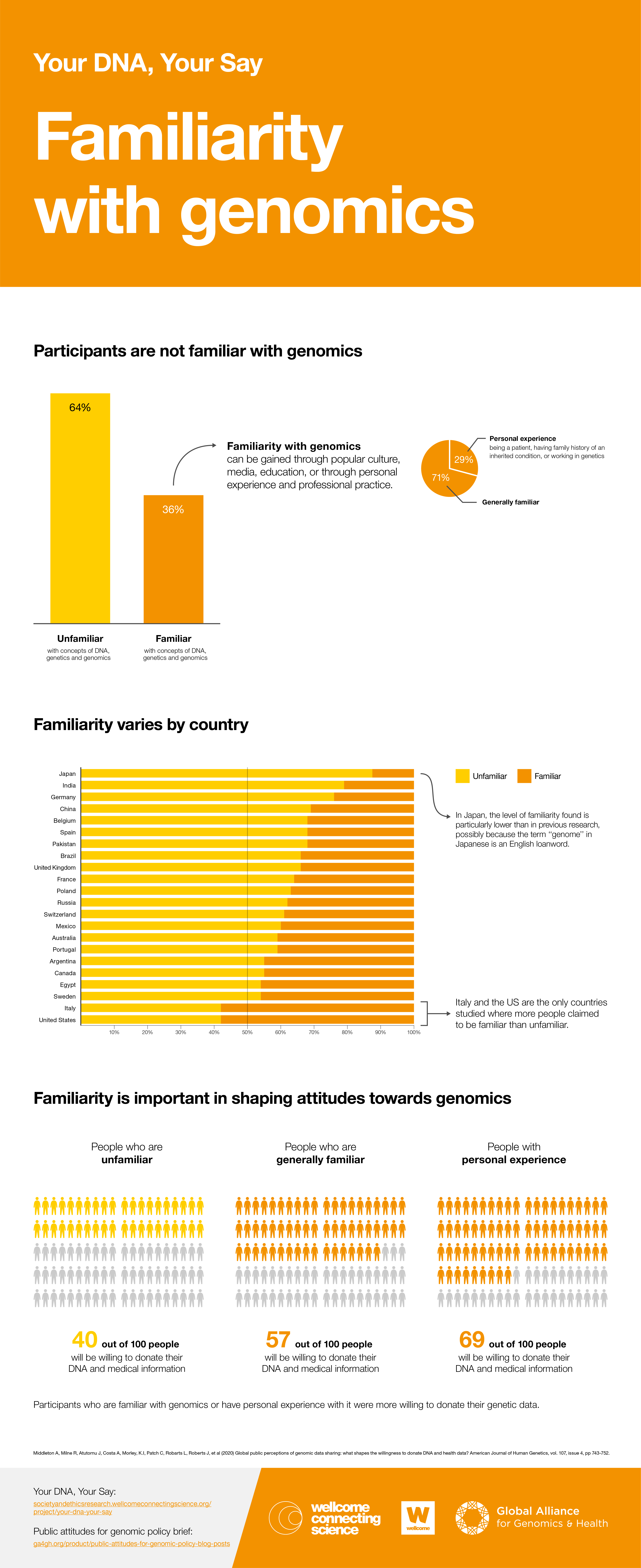About us
Learn how GA4GH helps expand responsible genomic data use to benefit human health.
Learn how GA4GH helps expand responsible genomic data use to benefit human health.
Our Strategic Road Map defines strategies, standards, and policy frameworks to support responsible global use of genomic and related health data.
Discover how a meeting of 50 leaders in genomics and medicine led to an alliance uniting more than 5,000 individuals and organisations to benefit human health.
GA4GH Inc. is a not-for-profit organisation that supports the global GA4GH community.
The GA4GH Council, consisting of the Executive Committee, Strategic Leadership Committee, and Product Steering Committee, guides our collaborative, globe-spanning alliance.
The Funders Forum brings together organisations that offer both financial support and strategic guidance.
The EDI Advisory Group responds to issues raised in the GA4GH community, finding equitable, inclusive ways to build products that benefit diverse groups.
Distributed across a number of Host Institutions, our staff team supports the mission and operations of GA4GH.
Curious who we are? Meet the people and organisations across six continents who make up GA4GH.
More than 500 organisations connected to genomics — in healthcare, research, patient advocacy, industry, and beyond — have signed onto the mission and vision of GA4GH as Organisational Members.
These core Organisational Members are genomic data initiatives that have committed resources to guide GA4GH work and pilot our products.
This subset of Organisational Members whose networks or infrastructure align with GA4GH priorities has made a long-term commitment to engaging with our community.
Local and national organisations assign experts to spend at least 30% of their time building GA4GH products.
Anyone working in genomics and related fields is invited to participate in our inclusive community by creating and using new products.
Wondering what GA4GH does? Learn how we find and overcome challenges to expanding responsible genomic data use for the benefit of human health.
Study Groups define needs. Participants survey the landscape of the genomics and health community and determine whether GA4GH can help.
Work Streams create products. Community members join together to develop technical standards, policy frameworks, and policy tools that overcome hurdles to international genomic data use.
GIF solves problems. Organisations in the forum pilot GA4GH products in real-world situations. Along the way, they troubleshoot products, suggest updates, and flag additional needs.
GIF Projects are community-led initiatives that put GA4GH products into practice in real-world scenarios.
The GIF AMA programme produces events and resources to address implementation questions and challenges.
NIF finds challenges and opportunities in genomics at a global scale. National programmes meet to share best practices, avoid incompatabilities, and help translate genomics into benefits for human health.
Communities of Interest find challenges and opportunities in areas such as rare disease, cancer, and infectious disease. Participants pinpoint real-world problems that would benefit from broad data use.
The Technical Alignment Subcommittee (TASC) supports harmonisation, interoperability, and technical alignment across GA4GH products.
Find out what’s happening with up to the minute meeting schedules for the GA4GH community.
See all our products — always free and open-source. Do you work on cloud genomics, data discovery, user access, data security or regulatory policy and ethics? Need to represent genomic, phenotypic, or clinical data? We’ve got a solution for you.
All GA4GH standards, frameworks, and tools follow the Product Development and Approval Process before being officially adopted.
Learn how other organisations have implemented GA4GH products to solve real-world problems.
Help us transform the future of genomic data use! See how GA4GH can benefit you — whether you’re using our products, writing our standards, subscribing to a newsletter, or more.
Join our community! Explore opportunities to participate in or lead GA4GH activities.
Help create new global standards and frameworks for responsible genomic data use.
Align your organisation with the GA4GH mission and vision.
Want to advance both your career and responsible genomic data sharing at the same time? See our open leadership opportunities.
Join our international team and help us advance genomic data use for the benefit of human health.
Discover current opportunities to engage with GA4GH. Share feedback on our products, apply for volunteer leadership roles, and contribute your expertise to shape the future of genomic data sharing.
Solve real problems by aligning your organisation with the world’s genomics standards. We offer software dvelopers both customisable and out-of-the-box solutions to help you get started.
Learn more about upcoming GA4GH events. See reports and recordings from our past events.
Speak directly to the global genomics and health community while supporting GA4GH strategy.
Be the first to hear about the latest GA4GH products, upcoming meetings, new initiatives, and more.
Questions? We would love to hear from you.
Read news, stories, and insights from the forefront of genomic and clinical data use.
Publishes regular briefs exploring laws and regulations, including data protection laws, that impact genomic and related health data sharing
Translates findings from studies on public attitudes towards genomic data sharing into short blog posts, with a particular focus on policy implications
Attend an upcoming GA4GH event, or view meeting reports from past events.
See new projects, updates, and calls for support from the Work Streams.
Read academic papers coauthored by GA4GH contributors.
Listen to our podcast OmicsXchange, featuring discussions from leaders in the world of genomics, health, and data sharing.
Check out our videos, then subscribe to our YouTube channel for more content.
View the latest GA4GH updates, Genomics and Health News, Implementation Notes, GDPR Briefs, and more.
12 Sep 2023
As genomic data become more widely available and used in healthcare, familiarity with genomics or genetics is likely to be important in shaping how people engage with the collection and use of their data in research and care.

As genomic medicine projects and services expand, the availability of genomic and genetic data across populations is vital to developing knowledge about genetics and its relation to health and disease, and to informing diagnosis and treatment. As genomic data become more widely available and more widely used in healthcare, familiarity with genomics or genetics in some form is likely to be important in shaping how people engage with the collection and use of these data in research and care. In this brief, we concentrate on the role of familiarity in shaping public attitudes towards genomics.
By familiarity, we mean the extent to which genomics or related terms (such as DNA and genetics) mean something to people. For example, familiarity could be gained through personal experience, professional practice, or through awareness derived from popular culture or the media rather than (or in addition to) knowledge and expertise. Here it is important to distinguish familiarity from technical knowledge about genomics. It can often be assumed that increased knowledge leads to greater uptake, and that consequently, it would be good to encourage the wider public to know more about genetics and genomics. By using “familiarity,” we make two points. The first is that the link between knowledge and attitudes has not been consistently shown empirically. Indeed, the nature of the relationship between knowledge and public attitudes has been a persistent question in efforts to understand how members of the public relate to science more broadly. This is further complicated by the range of contexts in which people may encounter genomics and the challenge of consistently measuring knowledge. Second, if the goal is to encourage people to engage meaningfully with the implications of genomics for their lives and those of their families, detailed knowledge of the technical content of genomics might neither be sufficient, nor indeed necessary, to enable engagement with, and inform decisions about, participation in genomics research and healthcare.
The Your DNA, Your Say (YDYS) study is the largest international study of attitudes towards the collection of genetic and health data. It collected survey responses from 37,000 people across 22 countries. The survey asked people whether they were familiar with DNA, genetics, and genomics. Such familiarity could be a result of popular culture, media, or education. Alternatively, familiarity may come from personal experience with genetics. This might come from being a patient or parent of a patient with a genetic condition, being a participant in research, having a family history of disease, or working as a genetic health professional or genetic scientist.
The study found that most participants in most countries surveyed are not familiar with the concepts of DNA, genetics, and genomics. While familiarity with these concepts varies across the countries in the study, Italy and the USA were the only countries studied where more people claimed to be familiar, rather than unfamiliar.
Across the 22 countries studied in YDYS, familiarity with genomics was consistently associated with a willingness to donate DNA and medical information for research. Respondents who reported being familiar with genetics through personal experience — being a patient, having a family history of an inherited condition, or working in genetics — were substantially more willing to donate genetic data. Conversely, a lack of familiarity with genomics was found to relate to hesitancy about donating data.
Familiarity is clearly an important factor in shaping how people engage with genomic data, and a detailed analysis of YDYS data from the UK, Australia, Canada, and the USA suggests that increasing familiarity may result in those people who are currently unsure about donation becoming willing to donate. However, this analysis also suggested that increasing familiarity may not shift attitudes on donation, particularly given potential concerns about privacy, potential discrimination, and the future use of data.
As a field, there is a need to focus on familiarising the public with genomics with the purpose of genomic research and the importance of data sharing. This should not simply involve communicating information about what genomics is and its benefits and risks, but also why and how genomics is done and its potential applications. Here policy-makers might usefully develop innovative engagement approaches to openly communicate about genomics in ways that are familiar and meaningful to individuals and communities. They might also openly acknowledge that like other health data, genomic data are sensitive, provide transparent information about how data are used, and demonstrate how they manage the risks of data being misused. This includes meeting people where they are, to invite public discussion and debate on the development of global genomics research and data sharing, and how this is relevant to everyday life and the future of healthcare.
Familiarity with genomics is important in shaping attitudes towards genomics and genomic data. A focus on familiarity allows genomic medicine to be grounded in existing knowledge and understandings that can help people consider its implications for them. For some, this may make genomics less threatening or more accessible, while for others, it may link it to wider concerns about the nature of healthcare or connect to questions of mistrust.

Richard Milne, Dianne Nicol, Maili Raven-Adams and the Public Attitudes for Genomic Policy Subgroup, Regulatory and Ethics Work Stream, GA4GH. The YDYS study was designed and led by Anna Middleton.
This brief is part of the Public Attitudes for Genomic Policy blog series, developed by the GA4GH Regulatory & Ethics Work Stream (REWS). Visit here to read past briefs.
